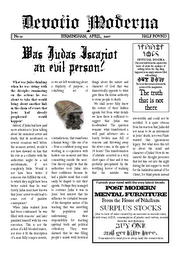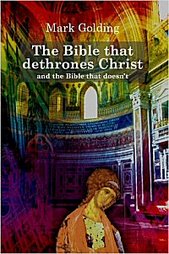The Government's perception of the public will is based on a top down view of what is meant by the word ‘sovereignty’. The idea that a King or a Government had the sovereign right to rule with an autocratic system of direct control may have been the system since the age of primitive civilisations like the Romans but that fact that it still shapes how people in power today view the word ‘sovereignty’ makes our system look positively derelict.
I have heard politicians often repeat the axiom that the public need to be represented by politicians because of the gap of knowledge between what the politicians profess to know and what is available in the public domain. In other words, the only way the public can exercise their sovereign right to rule their own affairs is through the elliptical and sometimes very discursive top down prism of information the State presents to them via a system that still does not open it’s corridors of power to proper public scrutiny. (A reading of the transcript of Dr Kelly’s interview with the Parliamentary Scrutiny Committee concerning the affair embroiling the BBC journalist Andrew Gilligan and the Internal State Machinery of Security suggests that Parliament has severe limitations when it comes to actually practising the safeguarding principle of political representation.
The word ‘sovereignty’ in this context takes on a rather dubious meaning that describes a political system bearing the characteristics of an autocratic State in practise and a democratic system in theory and rhetoric only.
The Government’s perception of the public is always based on the presumption that their collective knowledge of prognostic and diagnostic data concerning the future security of the State is a collection that the public would quantitatively and philosophically endorse as their priority for agreeing or disagreeing with the policies that eventually crawls out of this data pool as the beast of ‘Government Directives’. This perception is born out of a historical view of the public as being the ‘rabble’ that needs to be managed and controlled in every way possible other than by referendum, which is a perception that underscores the obstinate resistance by Government to the DEMAND made by the PUBLIC over centuries for a radical change in the system of governance.
My feeling is that the longer the Government delays referendum politics the more ungovernable the citizens will become. The more the Medieval characteristics of cronyism and autocracy resist change the greater will the public psychosis of rejection and detachment build a deeper mistrust of their peers until the whole megalith, whether full of intrinsically good and well intentioned people or not, from the Tax Office down to the Local Planning Authority, becomes so fractured and dysfunctional it creates the poltical cradle for another authoritarian regime to be born. It is the viscious cycle of A RECALCITRANCE.
The IRAQ WAR is a classic symptom of this ISSUE that undermines the fundamental right of the PUBLIC BODY to choose their destiny. It will not be buried by other events, regardless whether the events are orchestrated by Government. Government ministers will be held to account when the public eventually will be forced to act against the Government, to register their contempt and disillusion, by being aggressive and non-compliant in the work place, in their relationship with the police who represent Government autocracy (in their eyes), in their dealings with all State run institutions and services, in their view of the press and media whom they regard has having close ties with the seat of power in Government.
All in all, the Government is ignoring the signs that will lead to a greater alienation of the public, perhaps in areas that the Rowntrees POWer Inquiry did not cover, and the ensuing gradual breakdown in authority and rule, as we have seen with youth descending into nihilism in recent years, will be a situation that the Government has brought upon itself by being arrogant, distant, and deliberately insulting public opinion with their twisted perception of the public will and intellect. Increased civil disobedience is inevitable.
The Pentagon may well think they have sufficient contingency plans for the economic fallout from global warming that is fore casted but I doubt their crowd control technology will be able to neuter hysteria quite on the scale they imagine, which is a contingency that the UK Government is most likely to imitate like everything else they have imitated since the last world war.





